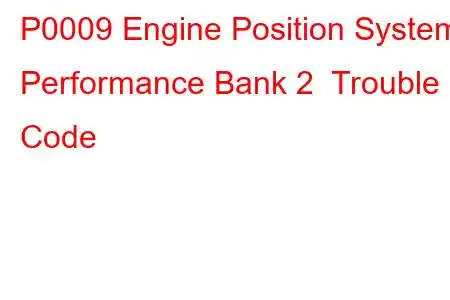P0009 Engine Positions System Performance Bank 2
OBD-II Trouble Code Technical Description
Engine Positions System Performance Bank 2
What does that mean?
This diagnostic trouble code (DTC) is a generic powertrain code, which means that it applies to OBD-II equipped vehicles, including but not limited to Cadillac, GMC, etc.
Although generic, the specific repair steps may vary depending on make/model.
This source has a good description of this P0009 code:
The Engine Control Module (ECM) tests for misalignment between both camshafts on one bank of the engine & the crankshaft. The misalignment would be at an idler sprocket for either bank or at the crankshaft. Once the ECM learns the position of both camshafts on one bank of the engine, the ECM compares the learned values to a reference value. The ECM will set a DTC if both learned values for one bank of the engine are exceeding a calibrated threshold in the same direction.
The code is more common in the following makes: Suzuki, GM, Cadillac, Buick, Holden. In fact, there are service bulletins for certain GM vehicles and the fix is to replace timing chains (including such engines as 3.6 LY7, 3.6 LLT or 2.8 LP1). You may also see this DTC in a vehicle that also has other related DTCs such as P0008, P0016, P0017, P0018, and P0019. Bank 2 refers to the side of the engine that doesn't contains cylinder #1. Most likely you will not see just this code, you will also have a P0008 code set at the same time.
Symptoms
Symptoms of a P0009 DTC may include:
MIL (Malfunction indicator lamp) illumination Roughness while accelerating Poor fuel economy Decreased power Timing chain "noise"Potential Causes
Potential causes of a P0009 code may include:
Stretched timing chain Crankshaft reluctor wheel has moved and is no longer referenced to top dead center (TDC) Timing chain tensioner problemPossible Solutions
If your vehicle is new enough that it still has powertrain warranty left, by all means let the dealer perform the fix. Generally, diagnosing and fixing this DTC will involve inspecting the timing chains and tensioners for excessive wear or misalignment, and inspecting the crank reluctor wheel for proper positioning. Then replacing parts as required. As said earlier, there are known issues with some GM engines so there may be updated or revised replacement parts. Please consult a factory service manual for more vehicle make & model specific troubleshooting steps.
Read: 60


